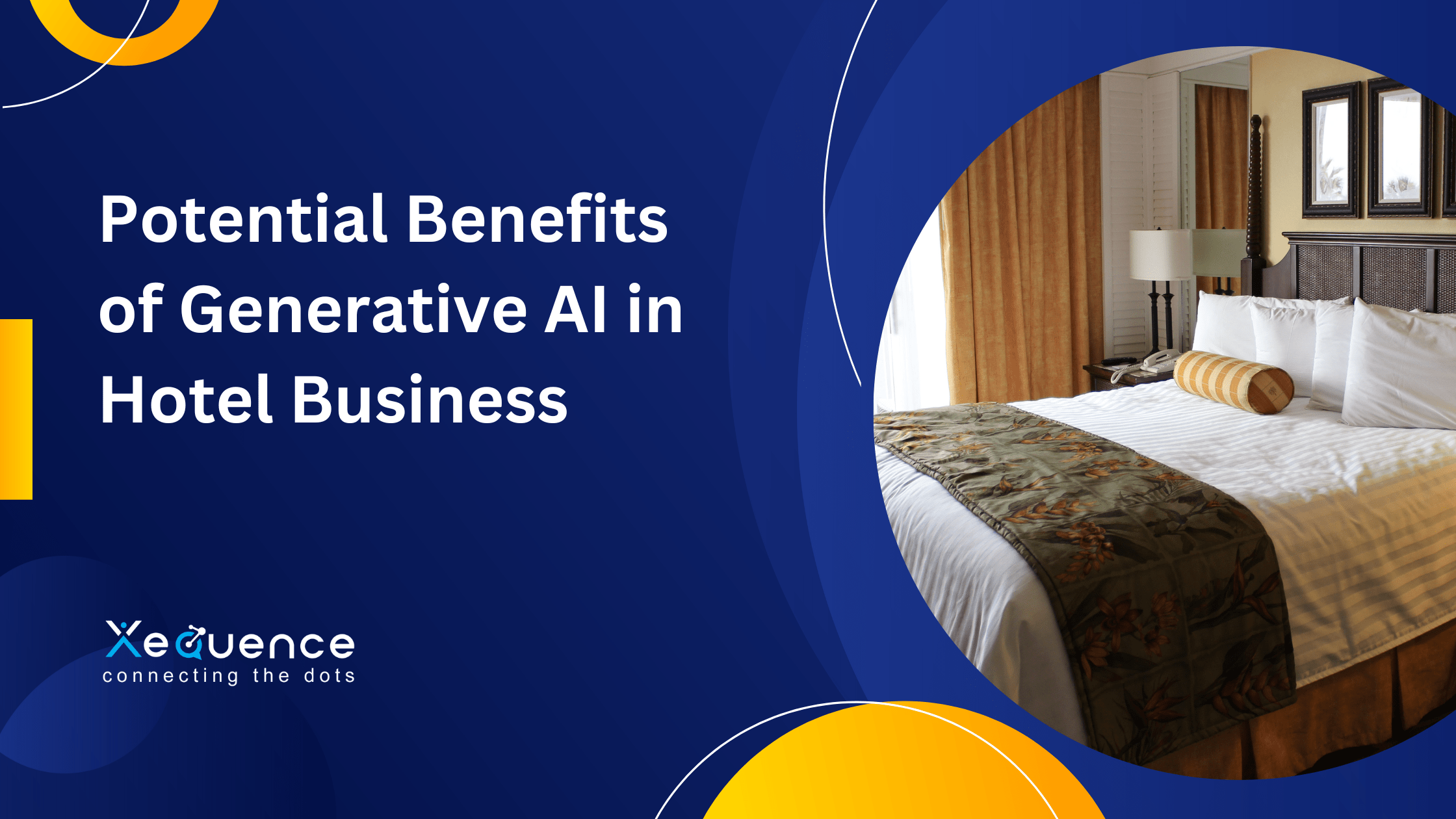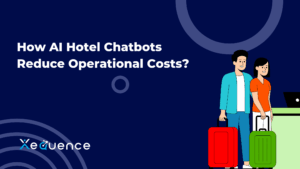- Home
- Artificial Intelligence
- Potential Benefits of Generative AI in Hotel Business
Potential Benefits of Generative AI in Hotel Business
- January 6, 2025
- XequenceAI
- Artificial Intelligence, Gen AI, Hotel Marketing

Unlocking the Potential Benefits of Generative AI in the Hotel Business
Numerous industries are being revolutionized by generative AI, and the hotel industry is no exception. AI can improve guest experiences, expedite processes, and boost revenue management by utilizing sophisticated machine learning algorithms. There are many options with generative AI, ranging from dynamic pricing strategies, predictive maintenance to automated customer service and tailored recommendations. Hotels are able to provide individualized services that foster loyalty, optimize resources, and gain a deeper understanding of client preferences thanks to this technology.
Applications and Use Cases of AI for Hospitality
Language Translation and Multilingual Chatbot Assistance
For visitors from foreign nations, multilingual chatbots and AI-powered language translation eliminate communication barriers. By enabling visitors to speak with chatbots in their own tongue, they make it easier to acquire information, schedule services, and solve problems. Globally, this inclusive approach raises visitor happiness and makes hospitality services more appealing.
AI-Powered Chabot
When it comes to reservations, cancellations, and other travel-related queries, AI-powered catbots provide real-time customer support with timely responses. Accessible 24/7, these catbots ensure seamless connections and reduce wait times for customers. They also assist with enhancing the overall quality of services by handling mundane questions and providing timely answers, allowing human staff to focus on more challenging tasks.
Language Translation and Multilingual Chatbot Assistance
For visitors from foreign nations, multilingual chatbots and AI-powered language translation eliminate communication barriers. By enabling visitors to speak with bots in their own tongue, they make it easier to acquire information, schedule services, and solve problems. Globally, this inclusive approach raises visitor happiness and makes hospitality services more appealing.
Guest Feedback and Sentiment Analysis
On a number of platforms, sentiment analysis technology helps businesses understand customer evaluations and comments. Their ability to identify trends and feelings provides valuable insights for improving services. Companies can also use real-time feedback analysis to take care of problems that arise while a guest is staying. It increases the likelihood that guests will return to the hotel by improving their stay and encouraging customer loyalty.
Personalized Customer Service
AI uses predictive analytics and consumer behavior analysis to deliver highly tailored services in the travel and hotel sector. By recommending activities or offering customized incentives, businesses can modify their interactions to suit client preferences.
Smart Room Settings and Technology
Visitors can use smart room technologies to control the lighting, temperature, and entertainment in their rooms through voice assistants or smartphone apps. By changing these characteristics based on user preferences, AI produces a highly personalized and comfortable environment.
Security and Surveillance
AI-driven security solutions monitor the property with smart cameras and sensors to increase visitor safety. When they detect unusual activity, these technologies can alert security personnel right away. Advanced technology such as facial recognition ensures safe access to rooms and facilities while maintaining stringent privacy and trust norms.
Task Automation
AI enables the automation of time-consuming procedures like as check-ins, check-outs, and reservation changes, significantly reducing errors and wait times. Billing and inventory control are automated, further streamlining operations and allowing staff to focus on giving visitors outstanding experiences.
Virtual Assistants
The tourist experience is enhanced by voice-activated virtual assistants, which provide instant access to hotel facilities and local information. Visitors can employ virtual assistants to acquire directions, choose a restaurant, and make bookings. This technology adds a personal touch and simplicity, making the stay more engaging and rewarding.
Benefits of Generative AI in Hospitality
Time and cost savings
Generative AI generates significant time and cost savings by automating operations that previously required human participation. For instance, AI algorithms may produce building designs in the fields of architecture and design based on specified parameters, greatly accelerating the design process. Besides that, it can assist in the creation of new product ideas and concepts by examining market trends and stakeholder feedback. Its enormous strength comes from how quickly AI can evaluate vast volumes of data and offer design suggestions.
Creativity amplification
Large-scale, imaginative, and captivating content creation is made possible by generative AI. For instance, AI-powered systems can produce engaging ad copy, images, and even video material automatically in the advertising sector, which removes the need for a lot of manual creative effort and serves as a useful tool for creative ideas.
Hyper-personalization
By evaluating consumer data and producing tailored product recommendations and offers based on individual tastes, generative AI may be used to heavily modify the customer experience. Additionally, voice automation can help e-commerce brands offer customer service in dynamically changing personalized voices, which will be more human-like and natural than monotonous, similar-sounding robotic voices. This will help to alleviate customer frustration.
Enhanced efficiency and productivity
Businesses may streamline workflows, increase productivity, and optimize resource allocation by using generative AI to automate time-consuming and complex procedures. Artificial intelligence (AI) algorithms, for example, can provide production schedules that are optimized in the industrial sector, reducing waste and maximizing efficiency. Plus, generative AI in contact centers can help customer service representatives by providing them with ticket summaries.
Data synthesis
Data synthesis offers a strong use case for generative AI. AI models can synthesis vast volumes of data and produce insightful results by utilizing their multi-dataset analysis capabilities. For instance, generative AI can be used in the finance industry to create prediction models that help companies make informed investment decisions by analyzing consumer behavior, market trends, and economic data.
Realistic simulations
With the help of generative AI, realistic simulations may be produced for a variety of applications, including research, entertainment, and training. AI-driven simulators, for instance, may faithfully replicate driving situations in the automotive sector, making it possible to test autonomous cars in a safer and more effective manner.
Improve customer experience
A notable and early business use of generative AI is improving the consumer experience. By using dynamic AI agents that respond to client requests in a more human-like manner, firms can enhance customer engagement. These chatbots’ underlying language models allow them to provide more thorough and intelligent responses, improving the breadth of consumer interactions.
Adaptive learning
Systems using generative AI are able to learn and modify continuously in response to feedback and fresh data. This feature enables the models to produce outputs that are more in line with user preferences and goals while also enhancing their performance over time. The effectiveness of experiences can be increased by using generative AI models in personalized education.
Conclusion
Artificial Intelligence is establishing new benchmarks for visitor happiness by improving client experiences through tailored services, intelligent support, and cutting-edge technologies. To remain at the forefront of the AI learning curve, industry leaders should keep funding the creation of value-driven AI-enabled services, put strong ethical standards in place to guarantee responsible AI use, and collaborate with digital innovators.
Recent Posts
Newsletter
Get regular updates on data science, artificial intelligence, machine
You may also like

AI Travel Assistants: The New Personal Travel Planners

5 Things an AI Travel Assistant Can Do in Seconds

How AI Hotel Chatbots Reduce Operational Costs?




